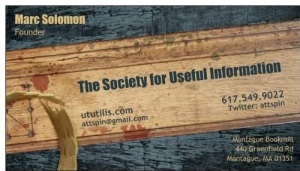[caption id="attachment_636" align="alignleft" width="240" caption="The marketplace for ideas need not be a storefront"]
 [/caption]
[/caption]That swelling is not transmitted by airborne virus or insect. Most likely it's the encrypted WIFI signal ready to auction off our attention based on:
- Who wants it,
- Where they will be for the next 45 minutes, and
- a coupon for perishable inventories echoed in the placeholders of past browser sessions.
Like any internet marketer Google's efforts are focused on converting web surfers to online shoppers, translating our calls for help into online ads it sells to the market. This arrangement connects some sellers to buyers but does little to resolve our need for quality information from credible sources. We must fend for ourselves when it comes to online investigations. And that isolation compromises our effectiveness as learners:
- The web by remote control: Google IS the internet. If it doesn't rank, it doesn't exist.
- The priority switcheroo: What landed last is what deserves to be acted on first.
- The sourcing dilemma: The motives behind information providers and how that squares with evidence used to substantiate their claims.
The simple truth is that Google has a great deal of value for the researcher -- little of it that's monetizable. Ironically Google's unrecovered assets are where web researchers should be investing big time:
- How to assess: frameworks and models: Aligning knowledge-seeking requirements with an informed sense of where to go and for acting on what we'll expect to find there
- How to ask: semantics, syntax, and operators -- The building blocks of query formation; the act of interrogating databases and training them to do our bidding
- How to act: context and meaning: Applying source fluency in order to scope the credibility, authenticity, and ultimately our understanding of where our findings are leading us
Internet sources and the search results they spawn are dynamic, conflicting, and open-ended. Your time commitments, however, are not. We have set objectives and hard stops for reaching them. Too often our need for closure and certainty suppress our hunger for learning. Connecting poor search results to preferable outcomes is like trying to shape up on a diet of lard and donuts. No matter how many searches and site results we retreat from the computer with more uncertainties and less time to settle them.
There are two reliable reasons most of us go online to research:
- Learn enough to act on what we’ll learn
- Reduce the uncertainty around what those actions may bring
These are the themes and objectives we'll be exploring each Thursday evening this summer at the Montague Bookmill. We hope you can join us for our weekly meetups from 7-9 pm. The series begins next Thursday, June 2nd. We look forward to your input and addressing the pending research projects that fire your desire to learn in the first place. A laptop is optional but do pack your own homegrown research problems.
And be prepared to share.


